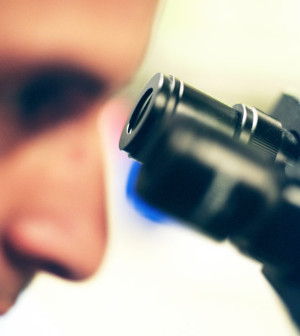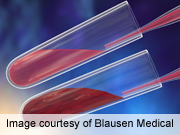- Could Your Grocery Store Meat Be Causing Recurring UTIs?
- Are You Making This Expensive Thermostat Error This Winter?
- Recognizing the Signs of Hypothyroidism
- 10 Strategies to Overcome Insomnia
- Could Artificial Sweeteners Be Aging the Brain Faster?
- Techniques for Soothing Your Nervous System
- Does the Water in Your House Smell Funny? Here’s Why
- Can a Daily Dose of Apple Cider Vinegar Actually Aid Weight Loss?
- 6 Health Beverages That Can Actually Spike Your Blood Sugar
- Treatment Options for Social Anxiety Disorder
Moving Toward Blood Test for Many Cancers


Researchers who identified more than 800 “markers” of cancer in patients’ blood say their findings could potentially lead to a single blood test for many types of cancer.
All cancers produce markers — or indicators — in the blood, and having a blood test that can detect cancer in the early stages would improve treatment and save lives, the researchers said.
The findings stem from a review of 19,000 studies.
“This is a new approach to early detection and the first time such a systematic review has been done,” study author Ian Cree, a professor at the University of Warwick, said in a Cancer Research U.K. news release.
“A single blood-based screening test would be a game changer for early detection of cancer, which could help make it a curable disease for many more patients,” Cree said. “We believe that we’ve identified all the relevant biomarkers; the next step is working out which ones work the best for spotting cancers.”
The markers will be reviewed and categorized, the researchers said.
Cancer Research U.K. funded the study by the U.K. Early Cancer Detection Consortium. The findings were presented this week at the National Cancer Research Institute Cancer Conference in Liverpool. Data and conclusions presented at medical meetings are typically considered preliminary until published in a peer-reviewed medical journal.
“This is an innovative and promising new approach. And although in its early stages, it shows how our increased understanding of cancer’s ‘markers’ and new technologies are combining to offer new opportunities to detect cancer sooner,” Sara Hiom, Cancer Research UK’s director of early diagnosis, said in the news release.
“Diagnosing cancer at an early stage generally means more effective treatment and that translates into better survival,” she added. “Our goal over the next 20 years is that three in four cancer patients will survive at least 10 years after their diagnosis.”
More information
The American Academy of Family Physicians has more about cancer.
Source: HealthDay
Copyright © 2026 HealthDay. All rights reserved.










